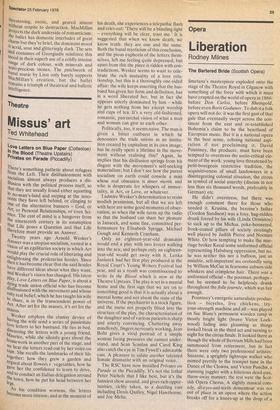Theatre
Missus' art
Ted Whitehead
Love Letters on Blue Paper (Cottesloe) in the Blood (Theatre Upstairs) Privates on Parade (Piccadilly)
There's something pathetic about refugees from the Left. Their disillusionment with
socialism almost always produces a disillusion with the political process itself, so that they are usually found either squatting in no-man's-land and sniping at the innocents they have left behind, or clinging to one of the alternative banners — God, or Art, or Personal Relationships, or even Science. The cast of mind is a hangover from the nineteenth century in its assumption that Life poses a Question and that Life therefore must provide an Answer. Twenty years ago Arnold Wesker's Answer was a utopian socialism, rooted in a vision of an egalitarian society in which Art Would play the crucial role of liberating and enlightening the proletarian hordes. Since then it has become clear that the said hordes have different ideas about what they want, and Wesker's vision has changed. His latest Play, Love Letters on Blue Paper, is about a (lying trade union official who has become disillusioned with the movement and whose Only real belief, which he has taught his wife tO share, is in the transcendent power of Art. After art for the masses, it's art for the Missus.
Wesker employs the clumsy device of ;laving the wife send a series of passionate Jove letters to her husband. He lies in bed, discussing the letters with a young friend, Maurice, while she silently goes about the housework in another part of the stage, and We hear the letters read out by her voice on taPe. She recalls the landmarks of their life together: how they grew a garden and argued about flowers v. vegetables, how he
gave her the confidence to learn to drive, and to conduct an Italian delegation around
the town, how he put his head between her legs.
As his condition worsens, the letters become more intense; and at the moment of
his death, she experiences a telepathic flash and cries out: 'There will be a blinding light — everything will be clear, trust me.' It is suggested that when we know death, we know truth: they are one and the same. Both the banal mysticism of this conclusion, and the pious euphoria of the letters themselves, left me feeling quite depressed; but apart from this the piece is ridden with contradictions. Wesker seems to want to celebrate the rich mutuality of a love relationship, but this is a thoroughly one-sided affair: the wife keeps asserting that the husband has given her form and definition, has in a word liberated her, but in fact she appears utterly dominated by him — while he gets nothing from her except worship and cups of tea. It's a very old-fashioned, romantic, patriarchal vision of what a man and woman can give to each other.
Politically, too, it seems naive. The man is given a bitter outburst in which he denounces the trade unions as an institution created by capitalism in its own image; has he really spent a lifetime in the movement without realising this? Again, he implies that his disillusion springs from his disgust with the movement's self-seeking materialism; but I don't see how the purest socialism on earth could console a man whose real obsession is timor mortis and
• who is desperate for whispers of immortality, in Art, or Love, or whatever.
I admire Wesker's determination to resist modish pessimism, but all that we are left with here are some good moments of observation, as when the wife turns up the radio so that the husband can share her pleasure in Janacek, and some fine, committed performances by Elisabeth Spriggs, Michael Gough and Kenneth Cranham.
Only an eighteen-year-old dramatist would end a play with two lovers walking into the sea; and perhaps only an eighteenyear-old would get away with it. Lenka Janiurek had her first play produced at the Royal Court's Young Writers Festival last year, and as a result was commissioned to write In the Blood which is now at the Theatre Upstairs. The play is set in a mental home and the first sign that we arc on to something good is that it is actually about a mental home and not about the state of the universe. If the psychiatrist is a stock figure, and the nurse not properly fitted into the structure of the play, the characterisation of the daughter and of various patients is sharp and utterly convincing. Chattering away mindlessly, fingers nervously working, Jean Boht gives a vivid portrait of a simple woman facing pressures she cannot understand, and Sean Scanlan and Carol King also catch the eye hi Tim Fywell's admirable cast. A pleasure to salute another talented female dramatist with an original voice.
The RSC have now installed Privates on Parade at the Piccadilly. It's not the lethal Peter Nichols that I like best, but it's the funniest show around, and gives rich opportunities, richly taken, to a dazzling cast including Denis Quilley, Nigel Hawthorne, and Joe Melia.


































 Previous page
Previous page